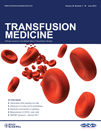
TRANSFUSION MEDICINE
Scope & Guideline
Innovating the future of blood transfusion and hematology.
Introduction
Aims and Scopes
- Clinical Practice in Transfusion Medicine:
The journal emphasizes clinical studies and reports on transfusion practices, including guidelines for safe transfusion, management of transfusion reactions, and patient blood management strategies. - Transfusion Safety and Quality Assurance:
Research focusing on improving the safety of blood transfusions, including studies on pathogen inactivation, blood collection practices, and the implementation of electronic safety systems. - Immunohematology and Blood Group Genetics:
Exploration of genetic factors affecting blood transfusion, such as alloimmunization, blood group discrepancies, and the genetic basis of blood group antigens. - Emerging Technologies in Blood Transfusion:
Investigation into new technologies and methodologies for blood collection, processing, and transfusion, including the use of predictive modeling and automated systems. - Policy and Ethical Considerations:
Discussions surrounding blood donation policies, ethical considerations in transfusion practices, and the sociocultural aspects influencing donor behavior.
Trending and Emerging
- Patient Blood Management (PBM):
An increasing focus on PBM strategies that emphasize minimizing blood transfusions while optimizing patient outcomes is evident, reflecting a shift towards more individualized care. - Impact of COVID-19 on Blood Donation and Transfusion Practices:
Research related to the effects of the COVID-19 pandemic on blood supply, donor behavior, and transfusion practices has surged, highlighting the need for adaptive strategies in crisis situations. - Technological Innovations in Blood Transfusion:
Emerging technologies, including automated systems for blood component processing and decision support systems for transfusion practices, are gaining importance in improving safety and efficiency. - Genomic Research in Transfusion Medicine:
There is a growing trend towards exploring genetic factors in transfusion practices, such as genetic screening for blood donors and the implications of genetic variations on transfusion outcomes. - Transfusion-related Immunology:
Studies examining the immunological responses to transfusion, including alloimmunization and transfusion-associated immunomodulation, are becoming increasingly relevant in understanding patient responses.
Declining or Waning
- Traditional Blood Component Therapy:
Studies focusing solely on conventional blood transfusion practices without consideration for newer patient blood management strategies are becoming less common as the field moves towards more evidence-based approaches. - Epidemiological Studies on Rare Blood Types:
Research on rare blood types and their epidemiology appears to be waning, possibly due to a shift towards more pressing issues in transfusion medicine such as safety and efficiency. - Outdated Diagnostic Techniques:
There has been a noticeable decrease in studies focusing on older diagnostic techniques for blood typing and crossmatching, as newer technologies and methodologies gain prominence.
Similar Journals
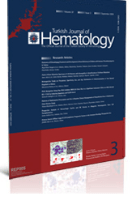
Turkish Journal of Hematology
Championing open access to vital hematology knowledge.Turkish Journal of Hematology is an esteemed publication dedicated to advancing the field of hematology, producing influential research since its inception in 1999 under the auspices of GALENOS PUBL HOUSE. With an Open Access model, it facilitates widespread dissemination of knowledge, allowing researchers, clinicians, and students to stay abreast of the latest developments in blood disorders and treatments. With an ISSN of 1300-7777 and an E-ISSN of 1308-5263, the journal holds a commendable position in the academic community, evidenced by its 2023 Q3 ranking within the hematology category and its standing at #80 out of 137 in the Scopus database, placing it in the 41st percentile. Covering a wide scope of topics within hematology, this journal serves as a critical resource for disseminating innovative research and clinical practices pertinent to the ongoing challenges faced in this vital area of medicine. With its continuous publication until 2024, Turkish Journal of Hematology remains a beacon for enhancing the understanding and treatment of hematological conditions within the Turkish and global medical communities.
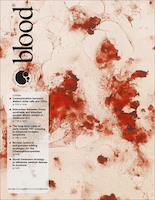
BLOOD
Illuminating Innovations in Hematology and Immunology.BLOOD, published by the American Society of Hematology, is a premier peer-reviewed journal in the fields of Biochemistry, Cell Biology, Hematology, and Immunology. With an impressive impact factor and ranking in the top quartiles (Q1) across multiple disciplines, BLOOD is essential reading for researchers and professionals seeking to stay updated on the latest advancements in hematology and related fields. The journal has been a cornerstone of hematological research since its inception in 1946, providing a platform for rigorous scientific inquiry and discourse. Its commitment to publishing high-quality original research, comprehensive reviews, and insightful editorials makes it a vital resource for students, practitioners, and scientists alike. By offering exceptional access to influential publications, BLOOD continues to shape the future of hematology and enhance understanding of blood-related disorders, marking its vital role in advancing both basic and clinical research.
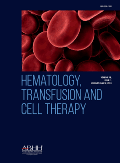
Hematology Transfusion and Cell Therapy
Connecting global experts in hematology and immunology.Hematology Transfusion and Cell Therapy, published by Elsevier, is a leading Open Access journal dedicated to advancing the fields of hematology, immunology, and transfusion medicine. Since its establishment in 2018, this journal has provided a vital platform for sharing innovative research and clinical advancements in the management of blood disorders and cellular therapies. Based in Brazil, it attracts a global audience, facilitating access to high-quality research that influences clinical practice and policy. With a current impact factor that places it in the Q3 category for both hematology and immunology as of 2023, the journal is recognized for its rigorous peer-review process and commitment to disseminating significant findings. By featuring a diverse range of articles, from original research to reviews, Hematology Transfusion and Cell Therapy aims to foster collaboration and knowledge sharing among researchers, professionals, and students alike, empowering them to tackle emerging challenges in their fields.
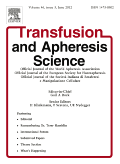
TRANSFUSION AND APHERESIS SCIENCE
Transforming Transfusion Practices with Cutting-edge ResearchTRANSFUSION AND APHERESIS SCIENCE, published by Pergamon-Elsevier Science Ltd, serves as a pivotal platform for researchers and practitioners in the fields of hematology, transfusion medicine, and apheresis. With an ISSN of 1473-0502 and an E-ISSN of 1878-1683, this peer-reviewed journal boasts a respectable Q3 ranking in the Hematology category as of 2023, positioning it within the 45th percentile among its counterparts. Operating from the United Kingdom, it provides comprehensive insights into the latest advancements and methodologies in transfusion practices and apheresis technology, crucial for enhancing patient care and therapeutic strategies. The journal's scope, covering key developments from 1996 to 2024, allows for a deep exploration of historical and emerging trends within the discipline. Moreover, its open access options facilitate widespread dissemination of research findings, fostering collaboration and innovation in the scientific community. For those dedicated to advancing knowledge in hematology, TRANSFUSION AND APHERESIS SCIENCE represents an essential resource, bridging theory and practice in this vital area of healthcare.
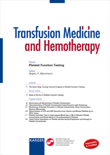
TRANSFUSION MEDICINE AND HEMOTHERAPY
Leading the charge in hematology research and clinical practice.TRANSFUSION MEDICINE AND HEMOTHERAPY, published by KARGER, is a prominent journal dedicated to advancing the fields of hematology and transfusion medicine. With an ISSN of 1660-3796 and E-ISSN 1660-3818, this esteemed journal has been a valuable resource for researchers and clinicians since its inception in 1973, with significant publication phases continuing into 2024. It currently holds a Q2 ranking in Hematology and a Q3 ranking in Immunology and Allergy, reflecting its impact and relevance in these critical fields. The journal features original articles, reviews, and clinical studies, presenting cutting-edge research that aids in the development of effective therapies and enhances patient care. Open access options are available, ensuring that crucial findings are accessible to a broad audience. As an important platform for dialogue and advancement in transfusion science, TRANSFUSION MEDICINE AND HEMOTHERAPY supports the global health community's efforts to improve treatment outcomes and foster innovation in medical practices.

Blood Transfusion
Advancing the Science of Blood Transfusion.Blood Transfusion is a leading journal in the fields of Hematology, Immunology, and Medicine, published by SIMTIPRO SRL in Italy. With its ISSN 1723-2007, the journal has established a significant presence in the academic community, as evidenced by its positioning within the Q2 category in Hematology and Medicine (miscellaneous) and Q3 in Immunology and Allergy for 2023. Notably, it ranks #38 out of 137 in the Hematology category, showcasing its impactful contributions to research and practice. Operating under a traditional publishing model, this journal provides valuable insights into advances in blood transfusion science, ultimately aimed at enhancing patient care and outcomes. Spanning from 2003 to 2024, the scope of Blood Transfusion covers a wide range of topics related to hematological and immunological research, making it an essential resource for researchers, healthcare professionals, and students engaged in these critical fields.

GEMATOLOGIYA I TRANSFUZIOLOGIYA
Pioneering Research for a Healthier TomorrowGEMATOLOGIYA I TRANSFUZIOLOGIYA is an esteemed journal published by the MINISTERSTVO ZDRAVOOKHRANENIYA in the Russian Federation, focusing on the vital fields of hematology and transfusion medicine. With a rich history dating back to its inception in 1983, the journal plays a significant role in disseminating critical research and advancements in these areas, particularly relevant given the evolving landscape of medical science. As a recognized publication, it is indexed in Scopus and holds a Q4 category ranking in Hematology for 2023, reflecting its niche but important contributions to the field. Researchers, healthcare professionals, and students can look forward to a variety of peer-reviewed articles that not only address contemporary issues but also pave the way for innovative practices in hematology. Although it does not currently offer open access, the journal remains a valuable resource for those seeking to stay informed about the latest findings and developments.
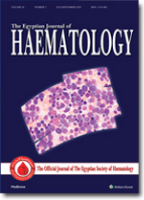
Egyptian Journal of Haematology
Unveiling Innovations in Hematologic ResearchThe Egyptian Journal of Haematology, published by WOLTERS KLUWER MEDKNOW PUBLICATIONS, stands as a pivotal resource in the field of hematology, particularly within the context of Egypt and the broader Middle Eastern region. This journal is dedicated to disseminating high-quality research that explores the latest advancements in blood disorders, hematologic malignancies, and transfusion medicine. With a focus on original research, case studies, and reviews, it aims to provide a comprehensive platform for hematologists, researchers, and healthcare professionals to enhance their understanding and management of hematological conditions. Although it is not an open-access journal, the rigorous peer-review process ensures that only the most impactful studies are published, contributing to the journal's reputation in the academic community. The Egyptian Journal of Haematology serves as an essential tool for advancing knowledge, improving clinical outcomes, and fostering collaboration among experts in the field.

BLOOD REVIEWS
Elevating knowledge in blood disorders and cancer care.BLOOD REVIEWS is a highly regarded journal published by Churchill Livingstone, specializing in the fields of Hematology and Oncology. With an impressive Q1 ranking in both disciplines and placing in the top 10% of its peer categories according to Scopus metrics, it provides an essential platform for the dissemination of cutting-edge research and reviews pertaining to blood disorders and cancer treatment. Since its inception in 1987 and continuing through 2024, the journal has established itself as a cornerstone for healthcare professionals, researchers, and students who seek to advance their understanding of hematologic and oncologic topics. While not an open-access journal, BLOOD REVIEWS retains a reputation for delivering high-quality, peer-reviewed articles that foster dialogue and innovation within the scientific community. For those in the United States and beyond, the journal serves as a vital resource, housed at the Journal Production Department in Edinburgh, Scotland, ensuring accessibility and a global reach in its critical academic contributions.

Indian Journal of Hematology and Blood Transfusion
Empowering Healthcare Through Cutting-edge Hematology ResearchIndian Journal of Hematology and Blood Transfusion, published by SPRINGER INDIA, serves as a leading platform for disseminating original research, reviews, and case studies in the field of hematology. With an ISSN of 0971-4502 and E-ISSN 0974-0449, this journal has been instrumental in advancing knowledge from 2000 to 2024, providing insights into critical issues surrounding blood disorders and transfusion practices. Currently ranked in the Q3 category for Hematology for 2023, it reflects a commitment to high-quality scientific content amidst a competitive landscape where it ranks 97/137 in Scopus for Medicine - Hematology, placing it in the 29th percentile of its peers. The journal primarily addresses a diverse readership, including researchers, healthcare professionals, and students, aiming to foster innovation and collaboration within the field. Although it operates under a subscription model, access options for individual articles and institutional subscriptions ensure that valuable research is disseminated widely to enhance medical practice and education in hematology.